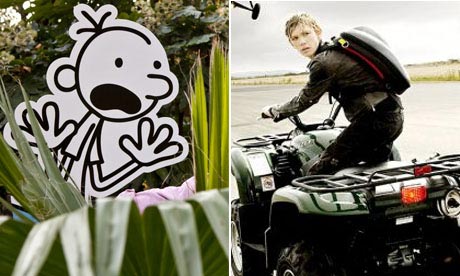
My son is an average nine-year-old. He doesn't think of himself as a wimp, a geek or a superhero but all the books around just now seem to centre on such characters. Why are wimps suddenly so popular? Are there any normal boys in fiction?
Amy, mother of Thomas
Currently, books are being heavily signposted by title, with a strong surge in wimps and geeks, possibly in reaction to the spate of boy heroes like Anthony Horowitz's Alex Rider, Charlie Higson's young James Bond and so on.
However, finding a character you "like" may involve looking at the subject more broadly and not worrying too much about the titles since there are so many different ways in which we relate to fictional characters. The wimps and geeks take a humorous look at their lives and travails – and successes – which anyone, whether they feel they fit the label or not, can enjoy.
Here are some of my favourite boys in fiction:
Cameron in Malorie Blackman's Pig Heart Boy, an ordinary 13-year-old facing an extraordinary situation;
Tom, the wonderfully unheroic central character who nonetheless gets swept up into a daring adventure in Philip Reeve's Mortal Engines;
William Beech, the unhappy evacuee who finds a place to grow emotionally and spiritually when he is taken in by the eponymous Mr Tom in Michelle Magorian's Goodnight Mr Tom;
Drem, the young boy with a withered arm who overcomes his disability to kill a wolf and become a clan warrior in Rosemary Sutcliff's Warrior Scarlet, a story written long before any campaigning about representing minorities in books for children;
Omri, the boy with an imagination and an ability to play, whose plastic figures of a cowboy and an Indian come alive in Lynne Reid Banks's The Indian in the Cupboard.
Written at different times, these books reflect a wide range of boys in a number of genres. And there are many more. Obviously, to make a story work, something dramatic has to happen and in each of the books I've mentioned the boys have to come through it by being braver, more imaginative, more empathetic or sometimes just happier than they had previously thought they were capable of being.
If you have a question for Book Doctor, email us at childrens.books@theguardian.com or tweet them to @GdnChildrensBks

